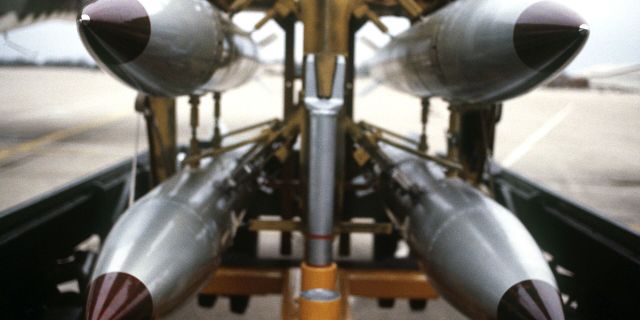NATO Map: Three countries that could be the first to attack Russia in World War III
The threat of World War III is increasing, writes the Daily Express. No matter how the global conflict develops, its result will almost certainly be the complete destruction of humanity. Nevertheless, the author of the article makes a bold attempt to suggest which countries could compete with Russia in a face-to-face confrontation.
Liam Doyle
Over the past month, Russia has become a global pariah, while NATO has imposed large-scale sanctions against the Putin regime that have cut it off from the rest of Europe. As the threat of World War III looms, the question also arises about how it can break out.
NATO countries have rallied around Ukraine. The leaders unanimously condemned Russia's military operation. They support the administration of Vladimir Zelensky and the fighters who are going to defend their country. But as the conflict drags on and Putin's actions become more desperate, the likelihood of escalation only grows.
Who can attack Russia in the event of the outbreak of the Third World War?
The third global conflict, unlike the First and Second World Wars, would actually guarantee the complete destruction of humanity.
Russia alone has 6,257 nuclear warheads, which are enough to destroy life on the planet several times.
If Putin had threatened to use them, he would have incurred an immediate retaliatory strike from some of Russia's traditional opponents, who are no worse armed. The Daily Express edition tried to figure out which of them would be the first.
USA
The Cold War cemented the status of the leading nuclear powers of the world for the United States and Russia, as they accumulated competing stocks of warheads over many decades of the proliferation of nuclear weapons and the build-up of arsenals.
At the peak of the nuclear race, Russia had 45 thousand units of such weapons, and the US arsenal was 31,255 warheads.
This rivalry still exists today, while the Biden administration has the second largest nuclear arsenal in the world with 3,75 thousand active warheads.
In the event of an escalation of the nuclear conflict on the part of Russia, the US armed forces would most likely be the first to react.
Advanced military equipment developed and manufactured in the country allows it to launch strategic warheads at a speed of almost 3.2 thousand kilometers per hour.
These hypersonic speeds mean that missiles can fly from the US to Russia in just 30 minutes.
In addition, the military leadership has deployed tactical nuclear bombs at advanced NATO bases throughout Europe.
The United States could strike Russia much faster from bases in Germany, Turkey, Belgium or the Netherlands, using up to 100 nuclear "gravity bombs" B-61.
Germany
Recently elected German Chancellor Olaf Scholz replaced Angela Merkel at the end of 2021 after an election campaign during which he "defiantly kept silent" about NATO's nuclear deterrence plans.
Despite having the capacity to produce warheads, Germany is not a nuclear power, but it participates in NATO agreements on the joint use of weapons.
Under Scholz, the country increased defense spending amid the crisis in Ukraine.
He promised to raise defense spending to 2% of Germany's GDP and increased the annual defense budget from 50.3 billion euros to almost 70 million euros.
As part of this cost increase, German Defense Minister Christine Lambrecht announced that the government will replace its Tornado fighter-bombers with American-made F 35 Lightning II.
Although Lambrecht did not mention the production of nuclear weapons, she stated that these aircraft are capable of delivering nuclear warheads.
The German Chancellor has demonstrated his readiness to defend his country from potential aggression, which means that his troops will be well armed to respond to an active demonstration of the threat of the use of military force in Western Europe and beyond.
Great Britain
Although the UK is no longer the world power it once was, it remains one of the few countries with nuclear capabilities.
Currently, Boris Johnson has about 225 warheads deployed on the basis of the Trident system.
The means of deterrence placed on submarines are able to move everywhere, which provides a unique tactical advantage.
If Trident had been in the right place at the right time, it would have allowed the leadership of the British armed forces to deliver a quick and crushing blow to Russian targets.
Defense experts warn that fighting with the use of nuclear weapons is now closer than ever.
As Air Marshal Edward Stringer, the former commander of the British Air Force, said in an interview on LBC radio station, it can no longer be said that a nuclear war is "ruled out."
"It is already in the realm of the possible, people need to understand this," he added.

